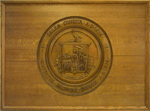Leslie's retreat: Difference between revisions
No edit summary |
No edit summary |
||
| Line 1: | Line 1: | ||
When reports that a cannon and ammunition had been hidden in North Fields, (now North Salem) | On Feb. 26, 1775, the first armed resistance by the colonies to British authority occured at North Bridge in Salem. When reports that a cannon and ammunition had been hidden in North Fields, (now North Salem)General Gage sent Colonel Leslie and 300 British soldiers from Boston to Marblehead by ship. | ||
General Gage sent Colonel Leslie and 300 British soldiers from Boston to Marblehead by ship. | |||
The citizens of Salem had been forewarned of the approaching British forces gathered at the North | The citizens of Salem had been forewarned of the approaching British forces gathered at the North | ||
Bridge and raised the draw. What might have been the first battle of the Revolutionary War was | Bridge and raised the draw. What might have been the first battle of the Revolutionary War was | ||
Revision as of 08:38, 4 April 2008
On Feb. 26, 1775, the first armed resistance by the colonies to British authority occured at North Bridge in Salem. When reports that a cannon and ammunition had been hidden in North Fields, (now North Salem)General Gage sent Colonel Leslie and 300 British soldiers from Boston to Marblehead by ship. The citizens of Salem had been forewarned of the approaching British forces gathered at the North Bridge and raised the draw. What might have been the first battle of the Revolutionary War was averted because of a compromise that was made by Colonel Timothy Pickering and Colonel John Mason of the local militia and Colonel Leslie. The draw was lowered and Colonel Leslie and his men marched a short distance beyond, turned and headed back to Marblehead.
See Also
- Old Naumkeag by C.H. Webber, p.176-177.
- Salem in the Eighteenth Century by James Duncan Phillips, p.352-360.
- An Historical Sketch of Salem by Charles S. Osgood, p. 47-
